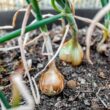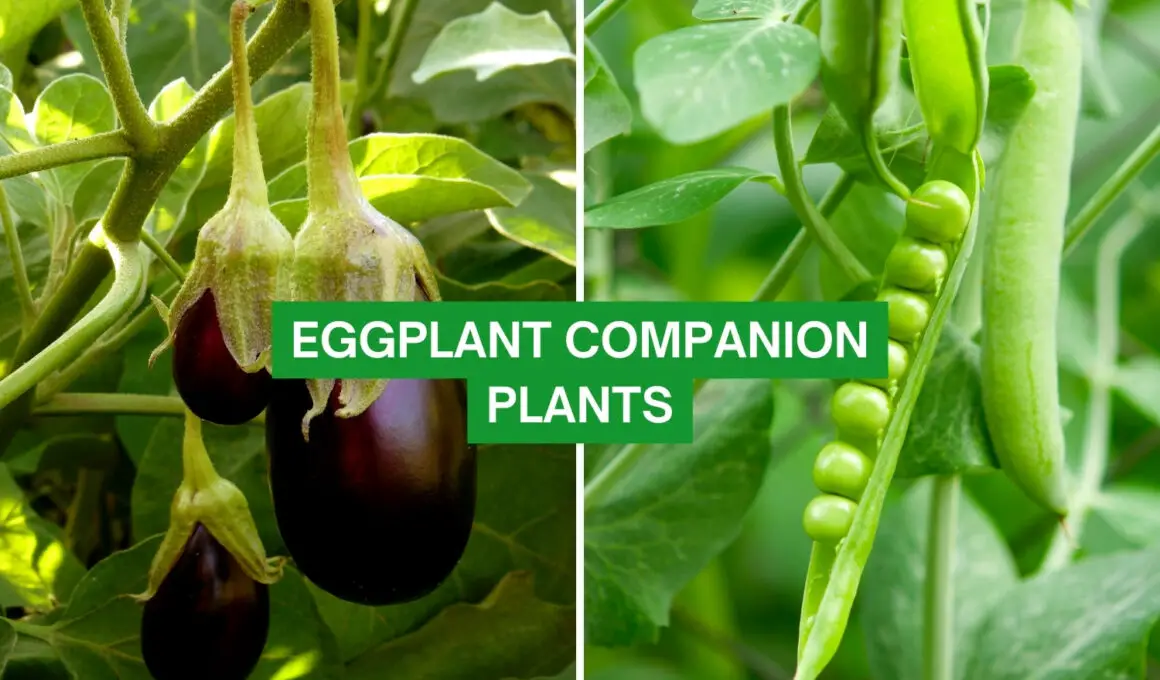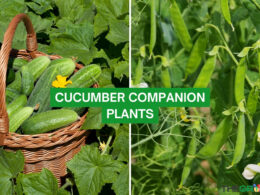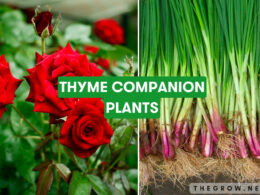In This Article Show
Eggplants, known for their deep purple color and versatile use in cuisine, are one of my favorite plants to grow. But, growing eggplants isn’t just about sowing seeds and ensuring they get ample water and sunlight. There’s an entire community of plants that can help these aubergine beauties thrive in your garden.
In this post, I’m sharing my extensive knowledge about the best companion plants for eggplants based on my experience and research. Whether you’re a seasoned gardener or just starting, I promise you’ll find something valuable here.
Remember, gardening is as much a science as it is an art, and by using techniques like companion planting, we’re able to work with nature to achieve impressive results.
Why Companion Planting is Beneficial for Eggplants
There are several reasons why companion planting is particularly beneficial for eggplants, a staple in my garden, and many others across the globe. Over the past 13 years, I’ve tried and tested these principles and seen their remarkable impact firsthand.
1. Improved Soil Fertility
Just like humans, plants too need a balanced diet to thrive. Certain plants, like legumes, can fix nitrogen in the soil. Planting these alongside your eggplants provides a natural and sustainable way to enhance soil fertility, resulting in healthier and more productive eggplants.
2. Pest Control
Pests can be a real nuisance in the garden, causing significant damage and reducing yields. Fortunately, some plants naturally repel certain pests. By strategically planting these around your eggplants, you create a natural barrier that helps keep your precious plants pest-free.
Get Gardening For Beginners
Our new EBOOK shows newcomers and green thumbs alike a step by step guide to growing the garden of their dreams.
3. Disease Resistance
Some companion plants have properties that can help prevent soil-borne diseases. This not only benefits the companion plants themselves but also your eggplants by creating a healthier overall garden environment.
4. Maximizing Space and Increasing Yields
Through the correct use of companion planting, you can maximize the use of space in your garden. Some plants grow well together because their growth habits are complementary, allowing for higher productivity in the same space.
5. Pollinator Attraction
Certain plants attract beneficial insects like bees and butterflies, which are necessary for pollination. Having these plants around your eggplants can enhance their pollination, leading to better fruit development.
6. Balanced Garden Ecosystem
Finally, companion planting helps create a balanced ecosystem in your garden, where each plant plays a role in supporting the others. It’s an excellent example of how we, as gardeners, can work with nature rather than against it, leading to healthier plants and a more rewarding gardening experience.
Ideal Companion Plants for Eggplants
As a long-time gardener, I can’t stress enough the importance of understanding the relationships between plants and leveraging these for a successful garden. Next, I’ll be sharing a list of specific plants that make great companions for eggplants and explaining why.
Herbs and Flowers
1. Basil
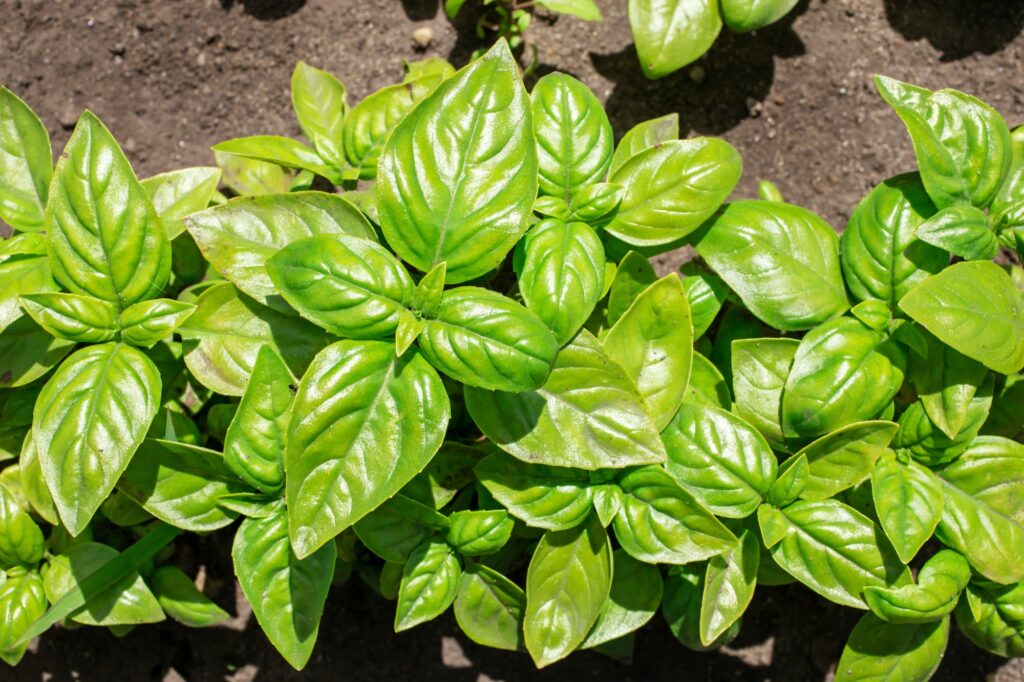
This aromatic herb does more than just add flavor to your dishes. When planted near eggplants, basil acts as a powerful deterrent to pests like mosquitoes and aphids, reducing the need for chemical insecticides.
Moreover, basil is thought to improve the flavor of nearby eggplants—a bonus for the culinary enthusiasts among us! And if you’re into companion planting for aesthetics, the vibrant green basil plants provide a beautiful contrast to the dark purple eggplants.
Get Gardening For Beginners
Our new EBOOK shows newcomers and green thumbs alike a step by step guide to growing the garden of their dreams.
2. Marigold

Marigold is a favorite among gardeners, not only for their sunny, cheerful appearance but also for their ability to repel various pests, including nematodes, which can cause significant damage to eggplants.
In addition to this, marigolds attract beneficial insects, contributing to the overall health of your garden.
3. Mint

Mint, with its strong fragrance, is a great companion for eggplants. It deters several pests, including aphids and ants. Just remember, mint can be quite invasive, so consider planting it in pots placed near your eggplants.
4. Thyme

Thyme’s delicate flowers are a magnet for pollinators, improving the pollination of your eggplants. It also repels a common eggplant pest, the flea beetle, helping your eggplants grow without hindrance.
5. Nasturtium

Nasturtiums attract beneficial insects, like bees and butterflies, that assist in the pollination process, while also deterring many pests. Its vibrant flowers add an extra splash of color to your garden, too.
6. Lavender

This beautifully fragrant plant not only repels unwanted pests from your eggplants but also attracts beneficial insects. The striking purple flowers of lavender plants can provide a lovely aesthetic complement to your eggplant patch.
Vegetables and Legumes
7. Beans

Beans are great companions for many plants, including eggplants, thanks to their ability to fix nitrogen in the soil. This enhances the fertility of the soil and promotes healthier growth in eggplants.
Furthermore, beans have a growth habit that is complementary to eggplants—they tend not to compete for space.
8. Peas

Like beans, peas are legumes that enrich the soil by fixing nitrogen, supporting the nutrient needs of your eggplants. They also have a relatively compact growth habit, so they won’t encroach on the space of your eggplants.
9. Spinach

Spinach is a wonderful companion for eggplants for several reasons. Its shallow roots don’t compete with the deeper roots of eggplants for nutrients and water. Additionally, spinach grows well in the shade provided by the larger eggplant plants, helping you maximize the use of space in your garden.
10. Swiss Chard
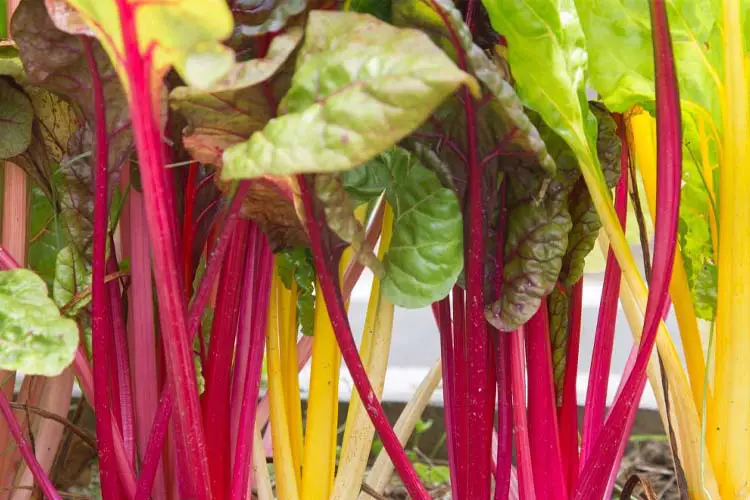
Swiss chard can be planted close to eggplants without competing for resources. This leafy green enjoys similar growing conditions to eggplants and can benefit from the shade provided by eggplant foliage.
11. Peppers
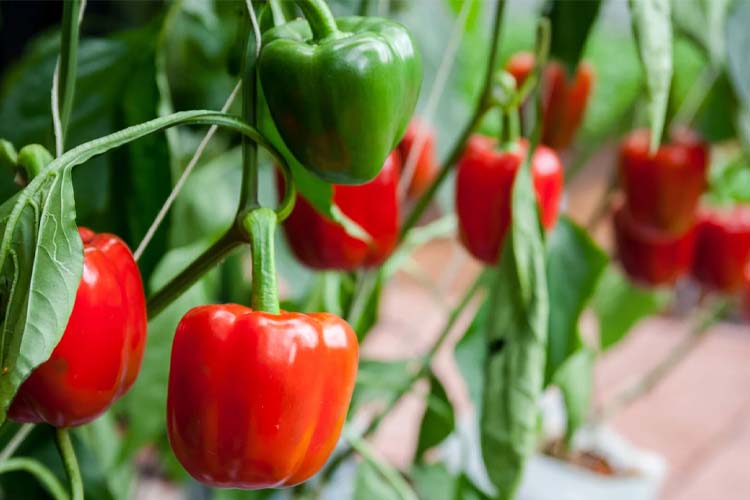
Eggplants and peppers are compatible neighbors in the garden, as they enjoy similar growing conditions. They can also offer each other some level of protection against common pests.
12. Potatoes
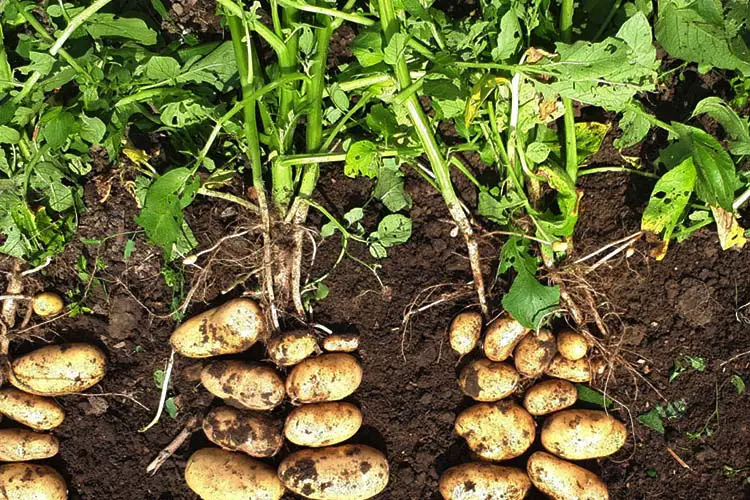
While potatoes have a reputation for being difficult companions due to their susceptibility to certain diseases, they can grow well with eggplants. The key is to ensure good airflow and crop rotation to prevent disease build-up.
Just as with herbs and flowers, companion planting with vegetables and legumes brings a range of benefits, from improved soil health to efficient use of space. Not to mention, it brings you one step closer to that abundant, diverse garden we all dream of.
Other Beneficial Plants
13. Sunflowers

Sunflowers can provide beneficial shade to eggplants in the heat of the summer, preventing the soil from drying out too quickly. They also attract a variety of pollinators, improving the pollination of your eggplants.
With their towering height and beautiful, radiant flowers, sunflowers might seem like an unlikely companion for eggplants, but they have their benefits.
14. Tansy
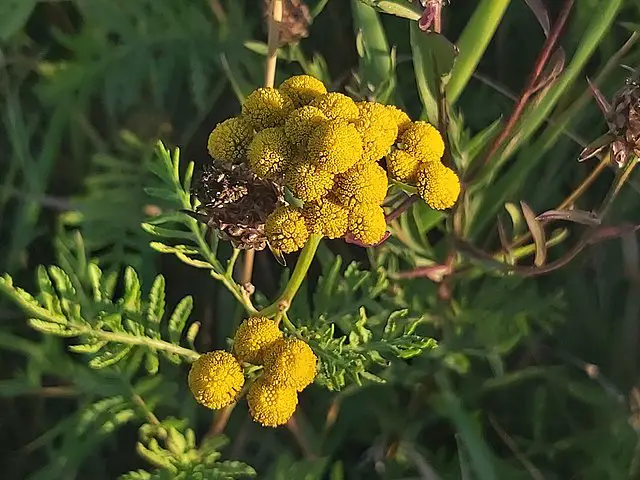
Tansy is known for its ability to repel pests like Japanese beetles and cucumber beetles. Planting tansy nearby can help protect your eggplants from these harmful pests. However, it’s important to note that tansy can be invasive, so be sure to keep its growth in check.
15. Borage
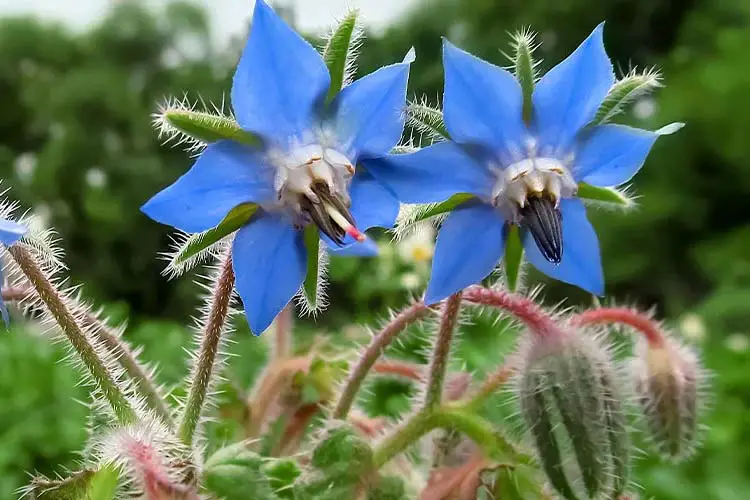
This herb, with its beautiful blue flowers, attracts beneficial insects and repels harmful ones, making it an excellent companion for eggplants. Additionally, borage is believed to improve the flavor and growth of many vegetables, eggplants included!
16. Catnip

Known for attracting cats, catnip also repels a multitude of pests that could harm your eggplants. Planting some around your eggplants can act as a natural deterrent.
17. Comfrey
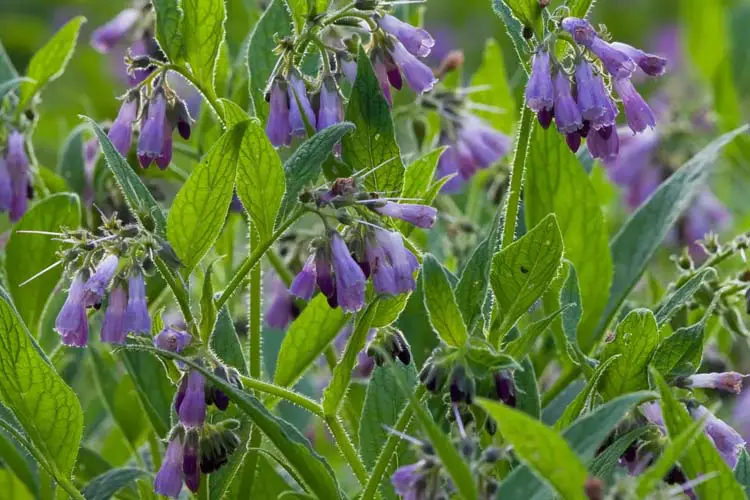
Comfrey’s deep root system brings up nutrients from below the soil surface, improving overall soil fertility. As it decomposes, it acts as a green mulch, providing valuable nutrients to your eggplants.
Remember, each garden is unique, and companion planting is as much an art as it is a science. Experiment with different combinations to see what works best in your specific situation. The key is to observe, learn, and adjust.
How to Implement Companion Planting with Eggplants
You now know the best companion plants for eggplants, but you may be wondering how to put this knowledge into practice. Here’s a step-by-step guide to get you started:
1. Understand Your Space
First, assess your garden space. How much room do you have? What’s the quality of your soil? How much sunlight does the area get? These factors will affect not only your eggplants but also their companion plants.
2. Choose Your Companions
Based on your assessment, select companion plants that will thrive in the same conditions as your eggplants. Remember to consider the growth habits, water and light requirements, and pest-resistant qualities of your chosen companions.
3. Plan Your Layout
Before you start planting, plan out your garden layout. Try to position your eggplants and their companions in a way that they won’t compete for sunlight or root space. For example, taller plants like sunflowers can be planted to th2. e north of shorter plants to avoid casting shade on them.
4. Time Your Planting
Some plants grow faster than others. To ensure that your eggplants and their companions can coexist peacefully, you need to time your planting correctly. For instance, if you’re companion planting with beans, you might want to give your eggplants a head start, as beans can grow quite rapidly.
5. Monitor Your Garden
Keep a close eye on your garden as your plants grow. If you notice any signs of pests or disease, intervene as soon as possible. Remember, the goal of companion planting is to create a harmonious garden ecosystem where all plants thrive.
Implementing companion planting in your garden might require some experimentation, but the benefits are well worth it. Not only will you improve the health and yield of your eggplants, but you’ll also create a beautiful, vibrant garden ecosystem.
Potential Problems and Solutions
While companion planting offers a range of benefits, it’s important to remember that it’s not a cure-all solution. There are potential challenges that you might encounter along the way. Here are some common problems and their solutions:
1. Competition for Resources
While companion planting aims to foster beneficial relationships between plants, there’s a risk that your chosen companions might compete with your eggplants for resources like water, light, and nutrients. To prevent this, ensure that your companions have different root depths and growth habits from your eggplants.
2. Spread of Disease
Some plants are susceptible to the same diseases, so planting them together can potentially facilitate the spread of these diseases. For instance, eggplants, potatoes, and tomatoes are all part of the nightshade family and are susceptible to similar diseases. Rotate crops annually to prevent disease build-up.
3. Overcrowding
Too many plants in a small area can lead to overcrowding, resulting in limited airflow and increased disease risk. Make sure you provide adequate space between your eggplants and their companions.
4. Invasive Companions
Some companion plants, like mint and tansy, can be invasive and might take over your garden if not managed properly. Plant these species in containers to control their spread.
5. Balancing Benefits
Some companion plants might attract beneficial insects but can also attract pests. Marigold, for instance, attracts aphid predators but can also attract spider mites. It’s all about finding a balance and monitoring your garden regularly.
In essence, successful companion planting requires careful planning, regular observation, and timely intervention. Despite these challenges, the benefits of companion planting are extensive. By understanding potential problems and how to address them, you can create a more harmonious and productive garden.
Frequently Asked Questions (FAQs)
Can I plant tomatoes and eggplants together?
While tomatoes and eggplants are both members of the nightshade family and share similar growing conditions, it’s generally not recommended to plant them closer together. They’re susceptible to many of the same diseases, which can spread easily if they’re in proximity. If you wish to plant them in the same garden, ensure they are sufficiently spaced out and practice crop rotation.
What should I, not plant near eggplants?
It’s best to avoid planting eggplants near other members of the nightshade family like potatoes, tomatoes, and peppers, to prevent the spread of common diseases. Similarly, avoid planting fennel near eggplants as it can inhibit their growth.
How far apart should I plant eggplants and their companions?
The ideal spacing between eggplants and their companion plants will depend on the specific companions you choose. However, a general rule of thumb is to leave enough space to prevent competition for resources while still allowing the companion plants to provide their benefits.
Can companion planting guarantee pest-free eggplants?
While companion planting can significantly reduce pest problems by attracting beneficial insects and deterring pests, it’s not a 100% guarantee. Regular monitoring and proper garden hygiene are still crucial for pest control.
Can I use companion planting in a container garden?
Absolutely! Companion planting is just as effective in container gardens as in-ground gardens. Just be mindful of the size of your container and the growth habits of your plants to prevent overcrowding.
Wrapping it up
Companion planting is a time-honored technique that taps into the power of plant diversity to create a thriving, productive garden. While it may require some experimentation and patience, the benefits it brings to your garden are worth the effort.
Companion planting sets your garden up for success, from improved soil health and natural pest control to better yields and a balanced ecosystem.
With their unique requirements and benefits, Eggplants can greatly benefit from the right companions. By understanding which plants work well with eggplants, you can harness the power of companion planting to grow healthier, more productive eggplants, and create a vibrant and diverse garden.
I hope this guide helps you on your journey toward mastering the art of companion planting with eggplants.




